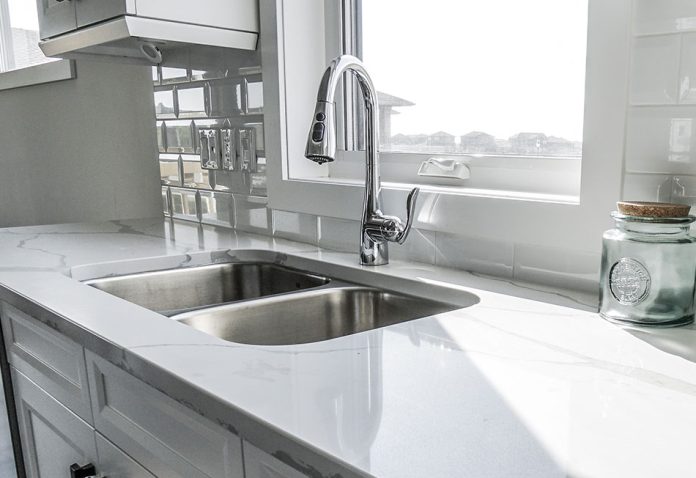A kitchen sink is more than just a functional fixture; it plays a crucial role in the overall design and efficiency of your kitchen. Whether you are remodeling or building a new kitchen, selecting the right sink can enhance both aesthetics and usability. With various styles, materials, and installation types available, making the best choice requires careful consideration of your needs and preferences.
When exploring different options, finding the right kitchen sink can significantly impact your kitchen’s functionality and visual appeal. The ideal sink should complement your countertop, fit well within your workspace, and meet your daily usage requirements. This guide will help you understand different styles, materials, and features to make an informed decision.
Types of Kitchen Sinks
1. Top-Mount (Drop-In) Sinks
Top-mount sinks are one of the most common and budget-friendly options. These sinks have a visible rim that rests on the countertop, making installation simple. They are compatible with various countertop materials and work well in both modern and traditional kitchens.
Pros:
- Easy to install
- Affordable
- Compatible with most countertop materials
Cons:
- The rim can accumulate dirt and grime
- May not provide a seamless look
2. Undermount Sinks
Undermount sinks are installed beneath the countertop, creating a smooth and clean appearance. This style is popular for modern kitchens as it enhances aesthetics and makes cleaning easier.
Pros:
- Sleek and seamless look
- Easy to clean without a visible rim
- Maximizes counter space
Cons:
- Requires professional installation
- Works best with solid surface countertops (not laminate)
3. Farmhouse (Apron-Front) Sinks
Farmhouse sinks have a deep, exposed front that extends past the countertop. They offer a rustic and elegant appeal, making them a favorite for traditional and country-style kitchens.
Pros:
- Large and deep, ideal for washing big pots and pans
- Adds a stylish focal point to the kitchen
- Available in various materials like fireclay and stainless steel
Cons:
- Requires custom cabinetry
- More expensive than standard sinks
4. Double-Bowl Sinks
Double-bowl sinks come with two separate basins, making multitasking easier. They are ideal for washing and rinsing dishes simultaneously or separating food prep areas.
Pros:
- Provides better organization for dishwashing
- Available in equal or offset bowl designs
- Compatible with various installation types
Cons:
- Can take up more counter space
- Smaller individual basins may not fit large cookware
5. Single-Bowl Sinks
Single-bowl sinks offer a spacious basin, making them perfect for washing large pots and pans. They are popular in contemporary and minimalist kitchen designs.
Pros:
- Ideal for small kitchens with limited counter space
- Easier to clean with no divider
- Available in various sizes and materials
Cons:
- Less flexibility for multitasking
- May not accommodate drying space for dishes
Best Materials for Kitchen Sinks
The material of your sink affects its durability, maintenance, and overall appearance. Here are some of the most popular materials used in kitchen sinks:
1. Stainless Steel
One of the most popular choices, stainless steel sinks are durable, lightweight, and resistant to rust and stains.
Pros:
- Affordable and widely available
- Easy to clean and maintain
- Resistant to heat and stains
Cons:
- Can be noisy when washing dishes
- Prone to water spots and scratches
2. Granite Composite
Made from a blend of granite stone and resin, granite composite sinks are durable and stylish.
Pros:
- Scratch and stain-resistant
- Available in multiple colors and finishes
- Non-porous and hygienic
Cons:
- Heavier than stainless steel
- Requires special cleaning products
3. Fireclay
Fireclay sinks are made from molded ceramic clay, fired at high temperatures for durability. They are commonly found in farmhouse designs.
Pros:
- Classic and elegant appearance
- Highly resistant to scratches and stains
- Long-lasting and durable
Cons:
- Expensive compared to other materials
- Can be prone to chipping if exposed to heavy impact
4. Cast Iron
Enamel-coated cast iron sinks are known for their durability and classic aesthetic appeal.
Pros:
- Strong and long-lasting
- Smooth, glossy finish adds elegance
- Available in various colors
Cons:
- Very heavy, requiring extra support
- Enamel coating can chip over time
5. Copper
Copper sinks offer a unique and luxurious look while naturally resisting bacteria.
Pros:
- Develops a natural patina over time
- Antimicrobial properties help reduce bacteria
- Durable and visually appealing
Cons:
- Expensive compared to other materials
- Requires regular maintenance to prevent tarnishing
Factors to Consider When Choosing a Kitchen Sink
1. Size and Depth
The size of the sink should match the available counter space and your kitchen needs. Deeper sinks are ideal for washing large dishes, while shallow sinks work better for compact kitchens.
2. Number of Bowls
Decide whether a single or double-bowl sink suits your cooking and cleaning habits. Double bowls are great for multitasking, while single bowls provide a larger washing area.
3. Installation Type
Your choice of installation (top-mount, undermount, farmhouse) should complement your countertop material and kitchen layout.
4. Faucet Compatibility
Ensure the sink has the correct number of pre-drilled holes for the type of faucet and accessories you plan to install.
5. Maintenance and Cleaning
Some materials require more maintenance than others. Stainless steel and composite sinks are easy to clean, while fireclay and copper may need special care.
Conclusion
Choosing the right kitchen sink involves balancing style, functionality, and durability. Whether you prefer a sleek undermount stainless steel sink or a rustic farmhouse fireclay model, selecting the right style and material will enhance your kitchen’s efficiency and appearance. Consider factors like size, installation type, and maintenance to find the perfect sink that meets your needs and complements your kitchen design.








